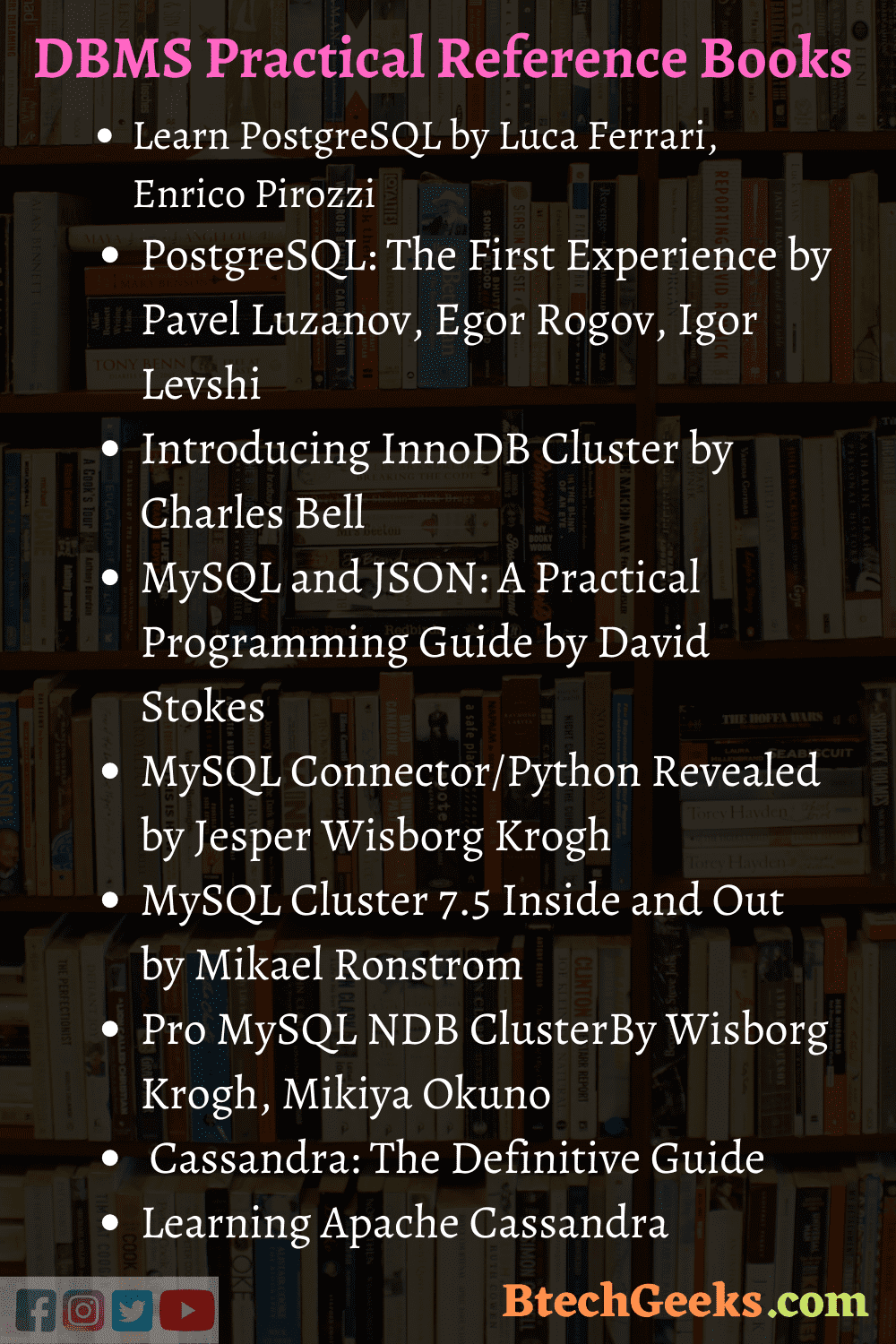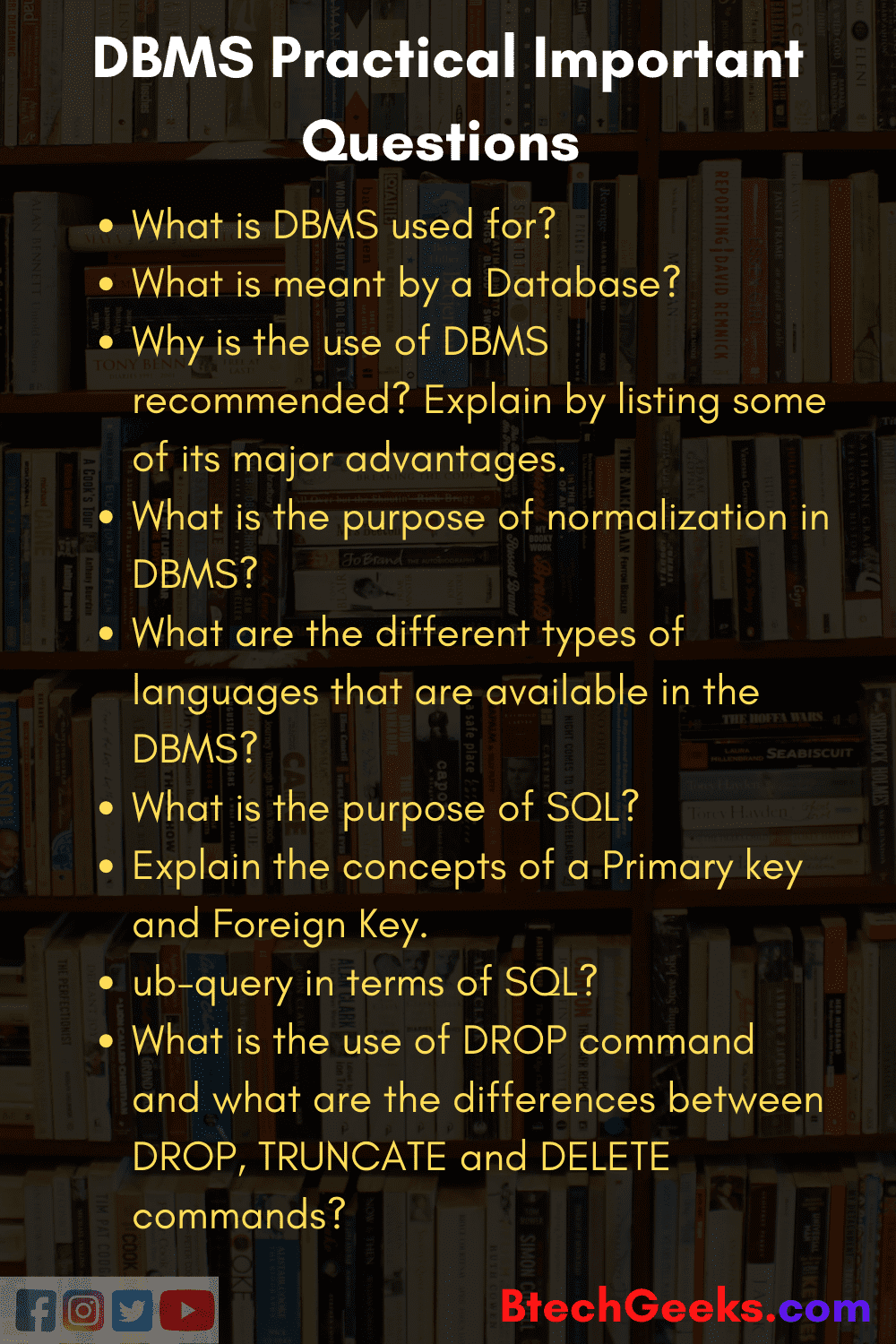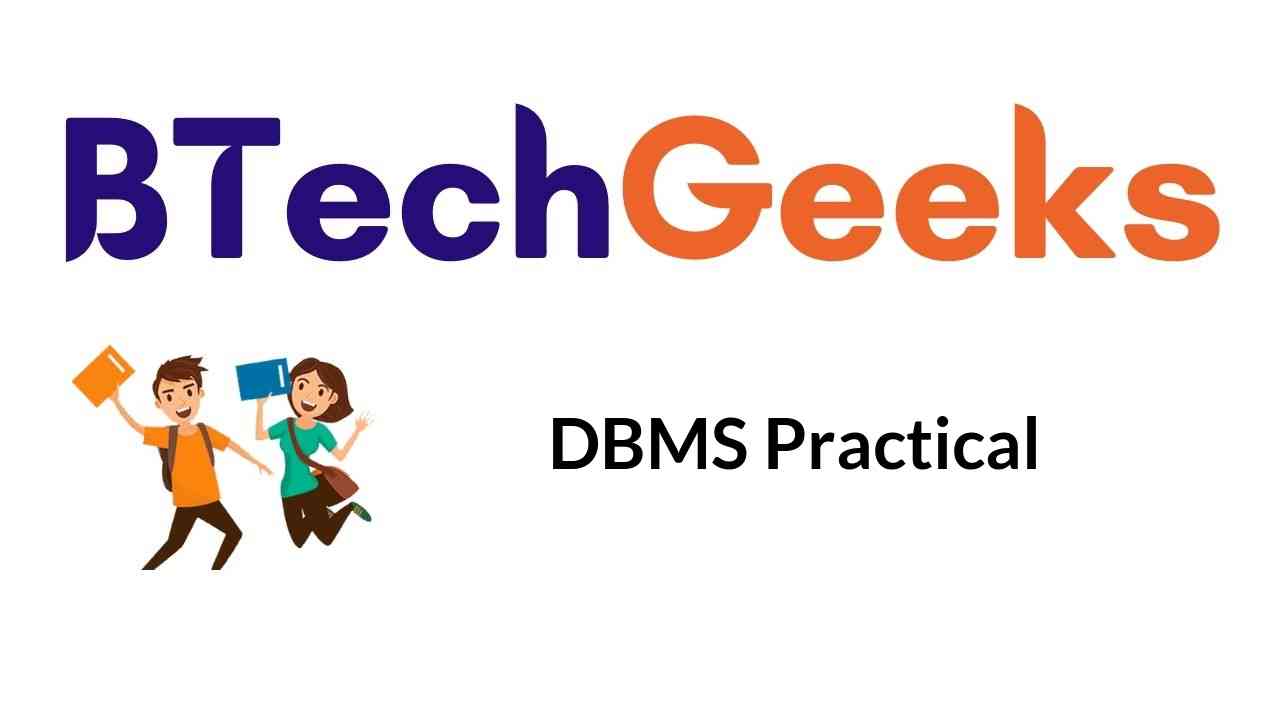DBMS Practical: Here in this article, students will find a list of notes and study material, DBMS practical questions, and answers pdf on the subject which can help them better understand the prerequisites required for their viva on Data Base Management System. You can use them as quick guidance to resolve doubts if any by using every possible related content of the Data Base Management System such as syllabus, Reference Books, DBMS Lab Programs with Solutions PDF, etc. all in one place.
Students can also visit Department Wise Lecture Notes for Preparation.
There are a lot of helpful resources which are available for the DBMS Practical; some of them are as follows:
- Introduction to DBMS Practical Lab Manual
- B.Tech Data Base Management System Notes and Study Material PDF Free Download
- B.Tech Data Base Management System Notes and Study Material PDF Free Download
- DBMS Practical reference books
- DBMS Practical curriculum
- DBMS Practical important questions
- What can I expect for my DBMS Practicals?
- What are the best DBMS Practical reference books I can use to prepare?
- What is the importance of DBMS Practicals?
- What is the DBMS Practical curriculum?
Introduction to DBMS Practical Lab Manual
DBMS is an important subject which looks at the handling of data and databases. The DBMS Practical looks at the practical elements of the subject, which include experiments and application-based uses of the subject.
Some of the experiments included for the practice are as follows.
- Drawing different kinds of models from a given database.
- Implementation of a database and its functions
- Data definition and modification once it has been created, etc.
B.Tech Data Base Management System Notes and Study Material PDF Free Download
Here students can find the various lab manuals that can help them understand how the lab experiments are conducted and the different viva questions that can be asked on the various systems used for DBMS. Students can download the study material and use it during their preparation process for the subject. Using the study materials provided by these notes will help aspirants get a better hunch on the concepts and the and an overall view on the subject.
The list of notes are as follows –
- Lab manuals for Database Management System by Abhishek Apoorv
- Lab manuals for Database Management System by JNTU Heros
- Lab manuals for Database Management System by Umesh Kumar
- Lab manuals for Database Management System by Snehal Kadavu
DBMS Practicals Reference Books
Books allow its readers to materialize the concepts better so that readers firstly get a more in-depth view of the subject and help them go over the specifics. Here in DBMS, there are different systems that users must become familiar with because the course required basic knowledge of systems that are important for DBMS. Students can use these books to understand various topics better and to score better grades during their exam.
The following is a list of books that students can utilize during their preparation process of the subject-
- Learn PostgreSQL by Luca Ferrari, Enrico Pirozzi
- PostgreSQL: The First Experience by Pavel Luzanov, Egor Rogov, Igor Levshi
- Introducing InnoDB Cluster by Charles Bell
- MySQL and JSON: A Practical Programming Guide by David Stokes
- MySQL Connector/Python Revealed by Jesper Wisborg Krogh
- Pro MySQL NDB ClusterBy Wisborg Krogh, Mikiya Okuno
- MySQL Cluster 7.5 Inside and Out by Mikael Ronstrom
- Cassandra: The Definitive Guide
- Practical Cassandra: A Developer’s Approach
- Learning Apache Cassandra
- Apache Cassandra: Hands-on-Training

DBMS Practicals Curriculum
The DBMS Practicals curriculum consists of various experiments which are carried out throughout the course. Below there is the DBMS Practicals curriculum listed experiment wise.
| Experiment | Aims |
| Experiment 1: ER diagram and relational model |
|
| Experiment 2: Creation and implementation of the database |
|
| Experiment 3: Data Definition (Schema) Modification |
|
| Experiment 4: Simple SQL Queries (single table retrieval) |
|
| Experiment 5: Advanced SQL Queries |
|
| Experiment 6: Implementation of views |
|
| Experiment 7: Triggers | To create queries using Triggers. |
| Experiment 8: Procedures | To create queries using Procedures. |
| Experiment 9: ORDBMS concepts | To implement ORDBMS concepts. |
| Experiment 10: RDBMS | To implement RDBMS using JDBC connectivity. |
List of DBMS Practical Important Questions
- What is DBMS used for?
- What is meant by a Database?
- Why is the use of DBMS recommended? Explain by listing some of its major advantages.
- What is the purpose of normalization in DBMS?
- What are the different types of languages that are available in the DBMS?
- What is the purpose of SQL?
- Explain the concepts of a Primary key and Foreign Key.
- ub-query in terms of SQL?
- What is the use of DROP command and what are the differences between DROP, TRUNCATE and DELETE commands?
- What are the different levels of abstraction in the DBMS?
- What is Correlated Subquery in DBMS?
- Explain the concept of ACID properties in DBMS?
- What is the main difference between UNION and UNION ALL?
- What integrity rules that are the main differences between Primary key and Unique Key?
- What is the concept of sxist in the DBMS?
- What is 1NF in the DBMS?
- What is 2NF in the DBMS?

FAQs About DBMS Practicals
Question 1.
What can I expect for my DBMS Practicals?
Answer: There are a cumulative ten experiments which are part of the DBMS Practicals course. Thus, out of the list of experiments mentioned in the DBMS Practicals curriculum, prepare all of them. Any experiment can come as your DBMS Practical so be wary and study all of them.
Question 2.
What are the best DBMS Practical reference books I can use to prepare?
Answer: The best DBMS Practical reference books are as follows:
- Learn PostgreSQL by Luca Ferrari, Enrico Pirozzi
- PostgreSQL: The First Experience by Pavel Luzanov, Egor Rogov, Igor Levshi
- MySQL Cluster 7.5 Inside and Out by Mikael Ronstrom
Question 3.
What is the importance of DBMS Practicals?
Answer: DBMS Practicals are important because they help provide the student with a well-rounded knowledge of the subject. Having only bookish knowledge is not enough, a person must have an application based on practical understanding of all subjects as well. This ensures that the student has understood the subject and topics under it fully.
Question 4.
What is the DBMS Practical curriculum?
Answer: There are a total of 10 experiments that are part of the DBMS Practical curriculum, all of which are equally important in supporting the learning of the student. The curriculum includes relational database building, data definition and modification, simple and advanced SQL queries, implementation of views, Triggers, Procedures, ORDBMS concepts, and lastly, RDBMS.
Conclusion
From the above study material provided, the information provided is reliable and genuine. Students can use these notes in preparing for their lab experiments in DBMS as the provided lab manual notes, reference books, curriculum, and important questions will help aid them
Refer:

